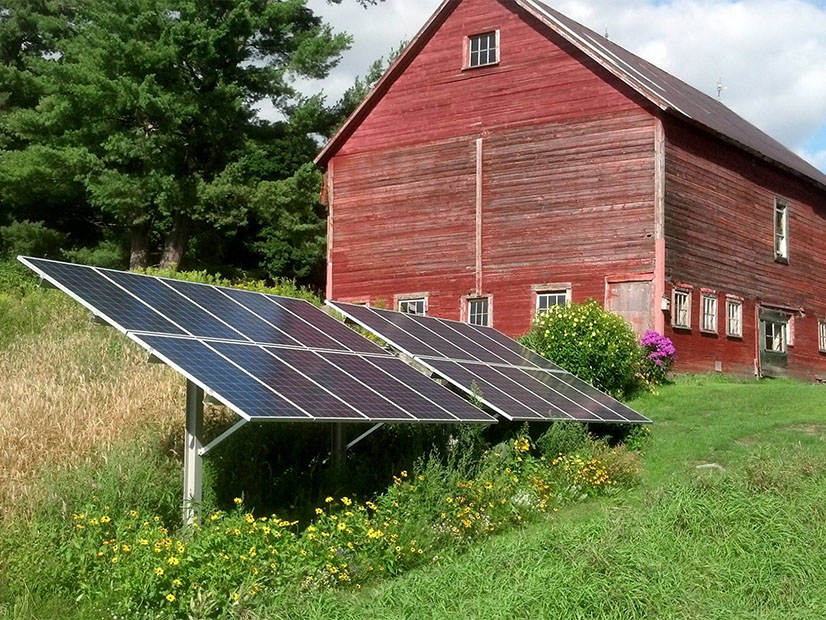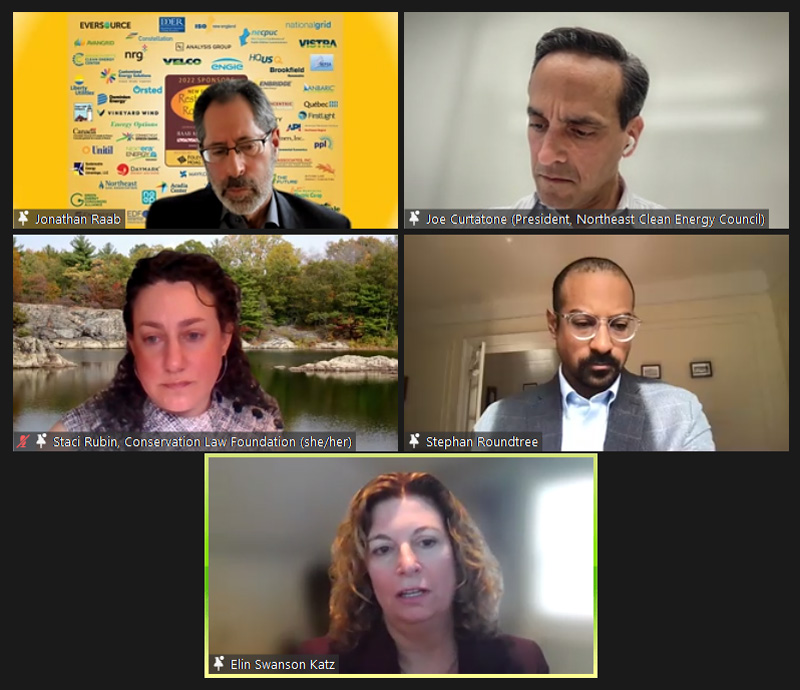
The New England Electricity Restructuring Roundtable changed gears for its first meeting of the year Friday with a focus on equity.
The roundtable, convened quarterly by Raab Associates, featured discussions on equitably decarbonizing the Northeast, a federal energy update and a case study on a unique partnership north of the border.
How to Decarbonize
A panel of speakers from New England organizations examined greening the region’s energy while ensuring that vulnerable communities are not left behind.
“Whoever has benefited the most in the system as it is should bear the greatest burden as we transition to a new system, and whoever hasn’t received benefits from the system as it is should be at the front of the line,” said Rev. Mariama White-Hammond, chief of environment, energy and open space for the City of Boston.
The panelists tried to define equity, noting that it can have various meanings.
“Equity doesn’t mean equal or the same, and it doesn’t happen by accident,” President of the Northeast Clean Energy Council Joe Curtatone said. “We should all align to a value that leads us with deliberate intention to have impact, especially for those who are impacted the worst.”
Another key to reaching the necessary communities is to ensure funding is available, according to Stephan Roundtree, senior regional director at Vote Solar.
“Part of the challenge I’ve seen in my work is inviting or asking folks with barriers to entry to navigate the really complex world of rebates and program eligibility,” he said, adding that states have an increased responsibility to provide resources and connect people to those resources.
Panelists also addressed the challenge of specific technologies, such as offshore wind, which they said is a valuable decarbonization tool that comes with unique equity challenges.
 A panel of speakers at the virtual Restructuring Roundtable on Friday discussing equitable decarbonization | Raab Associates
A panel of speakers at the virtual Restructuring Roundtable on Friday discussing equitable decarbonization | Raab Associates“It’s such an important and critical strategy to make a difference for the electricity sector,” said Staci Rubin, vice president for environmental justice at the Conservation Law Foundation.
Offshore wind developers and governments, she said, also need to involve people in the development process who are directly affected by the associated infrastructure.
“I’ve had recent conversations with several tribes who have really not been part of these conversations about offshore wind in a meaningful way,” she said. “We need to make sure that potentially impacted tribes and community organizations are able to have a say in terms of where the infrastructure will go.”
At the federal level, FERC is trying to make sure that it uses its regulatory powers in a way that meets equity goals, powered by the new Office of Public Participation, its director Elin Katz said.
“OPP is designed to provide opportunities for members of the public, and we have a particular focus on landowners, environmental justice communities, citizens of native nations, and consumer advocates and other community organizations,” she said, raising concern about how to bring those voices into FERC.
“We can’t continue to look at policy development as a top-down process that can fairly consider all sides and deliver equitable results if we don’t also include a diversity of voices in the process itself,” she said.
Case in Point
A powerful example of the way conversations around equity are changing came in the form of a case study on a unique agreement between Hydro-Quebec and the Mohawk Council of Kahnawà:ke.
The council is going to be a joint owner of a transmission line bringing energy from the company’s hydropower facilities in Quebec to New York City.
“In the past, there had been expropriations or land takings without consultation or compensation,” said Kahsennenhawe Sky-Deer, grand chief of the Kahnawà:ke Mohawk community.
The new joint agreement is different from what the community has seen in terms of land use, according to Sky-Deer.
“It’s groundbreaking and unprecedented, and something we welcome very much,” she said. “This is an untapped market in terms of partnership and recognition of Indigenous people.”
The partnership goes beyond a financial transaction and will involve jobs and training for Kahnawà:ke youth, Hydro-Quebec CEO Sophie Brochu said.
“We can be very viable business partners,” Sky-Deer said. “We do bring a different perspective and different energy to the table.”
Federal View
Patricia Hoffman, principal deputy assistant secretary for electricity at the Department of Energy, gave a rundown of new programs coming from the Infrastructure Investment and Jobs Act and called for coordination to speed decarbonization.
“Your priorities, the state, community and national priorities, are all critical as we work together to build a safe, reliable and resilient electric grid,” Hoffman said, adding that the infrastructure bill and associated investments are “a real opportunity to make a difference.”
Capitalizing on the investment opportunity that’s available will not be easy, she said. “We are all going to have to roll up our sleeves, but it is definitely worth the time and effort.”


